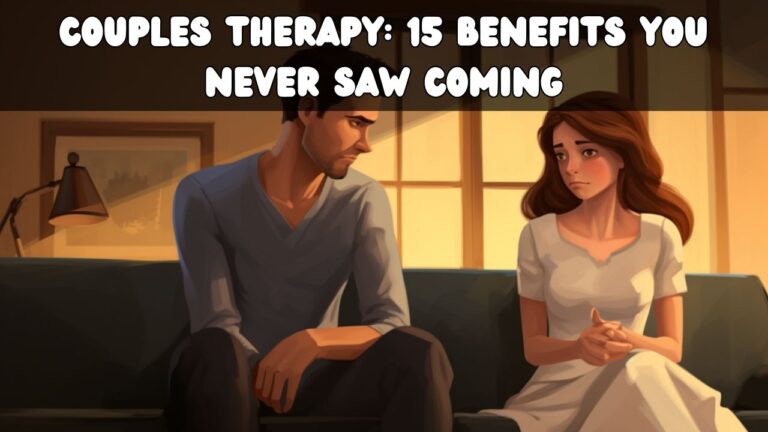
In the intricate dance of relationships, every couple finds moments where they step on each other’s toes. The harmonious blend of two distinct personalities, backgrounds, and set of experiences can sometimes lead to dissonance. It’s during these times that couples therapy comes into the limelight—not just as an emergency tool, but as a continuous journey of mutual understanding and growth. Join us as we delve deeper into the transformative world of couples therapy and shed light on its unexpected benefits.
The mere mention of couples therapy has often brought forth raised eyebrows, whispering in hushed tones about ‘trouble in paradise’. But in recent years, this antiquated notion has been dissipating. A fresh perspective is emerging—one that perceives couples therapy not as an emergency room for broken relationships, but more as a regular check-up or even a gym for relationship fitness. Just as we don’t wait for our health to deteriorate to visit a doctor, why should our relationship’s well-being be any different? This proactive approach to seeking therapy not only mends cracks but fortifies relationships, making them resilient to future challenges.
Think of couples therapy as a sanctuary—a space of introspection, healing, and renewal. Within its confines, couples undertake journeys that are as profound as they are transformative. They traverse their shared histories, uncovering layers of emotions and patterns of behavior that might have been lurking in the shadows. Guided by a seasoned therapist, couples learn to harness the power of vulnerability, opening doors to deeper intimacy and trust. The therapeutic space becomes a crucible where raw emotions are refined into understanding, empathy, and a renewed passion. It’s not just about finding solutions to present-day issues; it’s about paving the way for a future replete with mutual respect, understanding, and boundless love.

In any relationship, communication serves as the heartbeat, pumping life and vitality into the bond between partners. However, like any vital system, it requires regular check-ups and occasional tune-ups. Sometimes, amidst life’s cacophony, partners might feel they’re speaking different languages or, worse, feel unheard. This is where couples therapy plays a pivotal role, acting as the tuning fork that brings both partners onto the same frequency. By addressing the subtle nuances and core principles of communication, therapy ensures that couples not only hear but truly understand one another. Let’s dive into how this process reinvigorates the lifeblood of relationships.
One of the primary reasons couples find themselves at odds is the perception of being misunderstood or not understood at all. Within the therapy room, couples get an opportunity to see the world through their partner’s eyes. Therapists facilitate exercises and discussions that allow individuals to convey their feelings, concerns, and aspirations, fostering a climate of empathy. As partners begin to truly grasp each other’s perspectives, it becomes the foundation for more harmonious interactions outside the therapy room.
Active listening is more than just hearing words; it’s about understanding the emotions and intentions behind them. During sessions, couples are introduced to the art of active listening, which involves fully concentrating, understanding, and responding to what their partner is saying. This practice goes beyond surface-level comprehension, focusing on the undercurrents of emotion and thought. Over time, couples find that this skill becomes second nature, leading to fewer misunderstandings and more meaningful conversations.
One of the treasures couples therapy offers is a safe, neutral environment. Within this space, partners often find the courage to express feelings they’ve held back, whether out of fear, embarrassment, or concern for their partner’s reaction. Therapists guide couples in structuring their conversations in a manner that is both authentic and respectful. By learning and practicing these techniques, couples can create their own sanctuaries of open dialogue at home, ensuring that feelings, both positive and negative, are shared in a constructive manner.

The essence of a thriving relationship isn’t just about enduring through tough times but also cherishing the joys and warmth it brings. Over time, relationships can face wear and tear from life’s challenges, leading to fading of the spark once felt. This section touches the core of love’s vitality, examining how couples therapy doesn’t just mend the cracks but also embellishes the bond, making it even stronger than before.
The daily grind of life, coupled with responsibilities and stress, can sometimes push romance and intimacy to the backseat. Couples therapy provides the tools and guidance needed to rediscover that lost passion. Through sessions, couples explore their initial days of romance, identify the elements that have changed over time, and work on recreating those intimate moments. Therapists may suggest exercises, date nights, or activities tailored to reigniting the flames of passion, ensuring the relationship feels as vibrant as its early days.
Beyond the physical and superficial, an emotional connection acts as the anchor holding couples together. Therapy helps in deepening this bond, offering couples a platform to express their vulnerabilities, fears, and dreams. As partners share and listen, they build a bridge of mutual understanding, strengthening their emotional attachment. This newfound depth ensures the relationship can weather any storm, rooted in mutual trust and compassion.
Amid disagreements and conflicts, it’s easy to forget the worth and value each partner brings to the relationship. In therapy, couples are reminded of the unique strengths, qualities, and contributions of each individual. By celebrating these attributes and addressing any underlying issues, couples nurture an environment of mutual respect. When partners feel valued and respected, it leads to more supportive interactions, solidifying the foundation of their bond.

The intertwining journey of a relationship is unique; it’s an exploration of shared experiences and individual self-discovery. While couples therapy primarily centers around improving the relational dynamics, it inadvertently acts as a spotlight on individual growth and understanding. This dual focus — on the relationship and individual — ensures a holistic approach to healing and growth. The journey, though shared, resonates differently for each individual, revealing deeper layers of self-awareness, emotional understanding, and personal development.
At the core of any meaningful change is self-awareness. Couples therapy is not merely a platform to address grievances but a reflective space where partners confront their own behaviors, biases, and insecurities. As couples navigate the complex maze of their relationship dynamics, they often stumble upon personal revelations. These revelations, sometimes uncomfortable, act as stepping stones towards positive change. Whether it’s identifying triggers from past traumas or understanding deeply rooted beliefs affecting current reactions, therapy becomes a catalyst for self-realization. This newfound understanding can significantly alter one’s outlook, equipping individuals with the knowledge to make informed decisions in their relationship and personal lives.
Our emotions, as genuine and overwhelming as they may be, require a mature handling to constructively fit into the mosaic of a relationship. Couples therapy delves deep into the realm of emotional understanding. It provides tools and insights that enable partners to differentiate between an emotional impulse and a reasoned response. Over time, with guided sessions, partners learn to navigate their emotional landscape better, understanding when to express, when to introspect, and when to let go. This growth in emotional maturity not only reduces unnecessary conflicts but also fosters a nurturing environment where both partners feel valued and understood.
While the overarching goal of couples therapy might be relational harmony, it inadvertently creates a space for individual growth. Every session, every discussion, while centered on the relationship, offers insights into personal aspirations, fears, and challenges. Therapists often encourage partners to not just be better lovers, but better individuals. This might involve setting personal milestones, pursuing individual passions, or even seeking individual therapy sessions. Such a well-rounded approach ensures that as the relationship is fortified, the individuals within it also evolve, making them more empathetic, understanding, and self-assured.

Every relationship, no matter how idyllic, faces its fair share of challenges. It’s the navigation of these challenges that truly defines the strength and endurance of a relationship. While love and mutual respect form the bedrock of any successful partnership, external and internal obstacles often create discord and misunderstandings. Couples therapy acts as a beacon, guiding partners through these murky waters, empowering them with the tools and insights necessary to overcome obstacles and strengthen their bond.
Conflict, though daunting, is an inevitable facet of any relationship. But not all conflict has to be destructive. With the right approach, disagreements can be transformed into opportunities for growth, understanding, and reconnection. Couples therapy equips partners with constructive strategies to handle disputes. These might include:
By mastering these tools, couples can tackle conflicts head-on, ensuring disagreements foster understanding rather than distance.
Every couple exists within the broader context of their individual lives, meaning they must regularly confront external pressures, be it from work, family, health issues, or societal expectations. These external factors, though not directly related to the relationship, can strain communication, intimacy, and mutual understanding. Couples therapy helps partners recognize, address, and navigate these pressures by:
By acknowledging and addressing these external pressures, couples can ensure that their relationship remains a source of solace and support, rather than another stressor.
It’s often the smallest pebbles that cause the biggest ripples. Seemingly inconsequential misunderstandings or overlooked annoyances, if not addressed, can snowball into significant issues. Couples therapy focuses on honing partners’ abilities to spot these budding problems and address them promptly. By:
Proactively managing and addressing these concerns ensures that the relationship remains harmonious and both partners feel heard, valued, and understood.

As couples journey together, the road ahead isn’t always crystal clear. Long-term relationships not only thrive on love and mutual respect but also on shared goals, aspirations, and harmonized life decisions. With time, external factors, personal ambitions, and evolving individual personalities can change the relationship’s trajectory. Thus, a structured approach to future planning and alignment becomes essential to ensure that both partners are rowing the boat in the same direction. Couples therapy assists in creating this roadmap, ensuring that both individuals have their eyes set on a shared horizon.
Every flourishing relationship thrives on shared aspirations. These can range from tangible goals like buying a home or traveling to a dream destination, to more intangible ones like achieving mutual growth or fostering deeper trust.
Life-altering decisions, be it related to career moves, finances, or family planning, can significantly impact a relationship. Making these decisions collaboratively ensures that both partners are on the same page.
The essence of a long-lasting relationship is the unwavering commitment of both partners to face life’s ups and downs together.
The key to a harmonious future lies in mutual understanding, shared aspirations, and unwavering commitment. Couples therapy guides partners through this maze, ensuring they’re equipped to build a future that’s reflective of both their dreams.

Change is inevitable, especially in relationships. As time progresses, couples evolve—individually and collectively. While this evolution can sometimes lead to growing pains, it also offers a plethora of opportunities for strengthening bonds, rediscovering love, and fostering mutual growth. As couples stand on the brink of their shared future, they’re presented with two choices: either let the winds of change scatter them apart or harness these winds to soar together. Couples therapy, contrary to the traditional perceptions of being a ‘last resort,’ serves as a proactive guide to help partners choose the latter.
For long, couples therapy has been shrouded in misconceptions and stigma, often seen as a sign of a ‘failing relationship.’ However, it’s essential to break away from this mold and recognize therapy for the multifaceted tool it truly is.
As couples embark on their shared journey, it’s imperative to remember that the road won’t always be smooth. There’ll be highs, lows, turns, and detours. Yet, every step offers a chance for growth, connection, and mutual understanding.
In conclusion, couples therapy isn’t just about mending what’s broken. It’s about enhancing what’s already there, discovering hidden facets of the relationship, and building a future brimming with love, understanding, and shared aspirations. The path forward is paved with opportunities—seize them, embrace growth, and let the journey enrich your bond.
Dr. Seraphina Hart, PhD, is a relationship therapist with over two decades of experience in the field of psychology and human behavior. With a rich academic background from Stanford University, she has an in-depth understanding of the complexities of interpersonal relationships. Dr. Hart's journey began with a deep fascination with the human mind and how it forms emotional connections, leading her to specialize in relationship therapy.
Her compassionate approach and unique methodology are informed by her extensive study of various therapeutic modalities, including Cognitive Behavioral Therapy (CBT), Emotionally Focused Therapy (EFT), and mindfulness techniques. Dr. Hart believes in the power of empathy and understanding in healing and transforming relationships. With her guidance, clients learn to navigate their emotions, communicate effectively, and foster a deep sense of self-awareness.